Brew Kids on the Block: Elizabethtown microbrewery’s journey to ‘community watering hole’
Aaron Hawkins tends to customers on Friday, April 22. Hawkins works as a planner for the city of Elizabethtown when he’s not pouring pints.
Brewing alcohol is a process older than civilization itself. The earliest evidence of brewing dates back to around 7,000 BCE near the Yellow River Valley in China — nearly 4,000 years before Indus Valley societies rose to power.
The greatest stories ever written, the most resonant emotions ever shared, the best plans ever hatched — it’s no stretch to say that many began with a pint poured for a friend or colleague.
Aaron Hawkins, Ashley Willoughby and Josh Durham hatched their own plan over a glass of homebrewed beer nearly a decade ago. In 2017, it became Flywheel Brewing, located in Elizabethtown.
“After… just one beer — or a few extra — we started talking about ‘oh we should open up a brewery, this would be a great idea, it’s a hot market right now, blah blah blah,” Hawkins said.
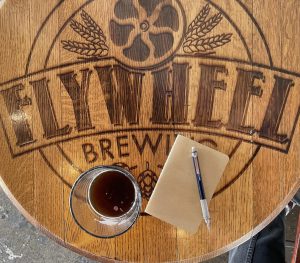
Hawkins and Willoughby had known each other loosely through ties to WKU. They later worked together at a social services organization in Elizabethtown.
They developed a friendship aided by a mutual love of beer. In 2013, homebrewing became their shared pastime after a visit to a hobby shop in Louisville.
They found equipment, classes and recipes to start out. Their first brew was basic, a pale ale — “nothing much to it.”
“It turned out way better than we ever expected it, and it was actually drinkable,” Hawkins said.
It was a good beer, and they could actually make it. They kept at it, brewing five gallons at a time and giving away about 70% of what they made to friends and family.
“If you’ve got really good friends, they’ll tell you the good and bad. If you’ve got acquaintances, they’re going to be like ‘ah, yeah, it’s good,’” Willoughby said.
Hawkins and Willoughby received enough positive feedback to keep going and enough constructive feedback to get better. They continued their hobby for about four years, branching out into new recipes and styles and continuing to share the fruits of their labors.
During this time in the 2010s, America saw a microbrewery boom. In 2006, the United States had 1,460 establishments in total. By 2019, 8,386 breweries were scattered throughout the country, according to the Brewers Association.
This trend went beyond U.S. borders as well. At the time, Durham was living with his wife in Beijing, China. Willoughby was a longtime friend of Durham’s brother years before they were ever partners.
After working as a high school teacher in the U.S. for years, Durham took a high-end printmaking job and moved overseas in an effort to “throw off the shackles of the workweek.”
“While I was there, I befriended the couple behind Beijing’s craft beer revolution [Carl and Liu Fang Setzer], and I lived at their brewery,” Durham said.
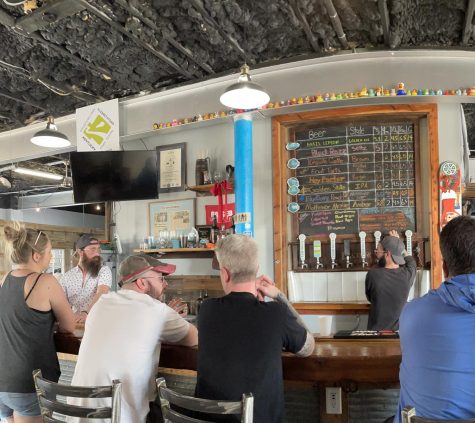
The Setzers own and operate Great Leap Brewing in Beijing, the first microbrewery of its kind in the city. Since 2010, it has opened a total of four locations across two districts in Beijing.
“Everybody I met in China, I met in that brewery. I lived at that brewery, I loved it, I had a great time,” Durham said.
The atmosphere of Great Leap stuck with him even after he returned stateside. He was working at a cable network design firm in Louisville when Hawkins and Willoughby called him with an idea for a brewery of their own.
Louisville, often seen as Kentucky’s “trendiest” city, saw a rapid influx of brewers seeking to ride the market wave. The trio recognized Louisville’s saturated market and decided to look elsewhere for untapped potential.
They looked across the state for opportunity — Bardstown, Owensboro, Bowling Green. The solution ended up being much closer to home: Elizabethtown.
“I jumped in 100%, and I wanted to create that [Great Leap] vibe here,” Durham said. “Growing up here, E-town is the center of the Bible Belt, and we had two kinds of drinkers: those that didn’t drink, and those that drink way too much.”
“Teetotaling and debauchery,” Durham described it.
He wanted to find a “middle path” — completely unique from what was offered in town then. You won’t find karaoke, country music or Bud Light anywhere near their bar to this day.
“We’re trying to create a place that is so atypical for a place like E-town — at least it was five years ago, it’s not now — because we wanted to set a different vibe,” Durham said.
After weighing the odds, the trio took the plunge and purchased a building that previously housed a mechanic garage. It offered just enough space and support to give them a proper place to brew and serve.
Hawkins called the start “terrifying,” to which Willoughby agreed. They weren’t coming in with an extravagant budget, a similar start to the story of many microbreweries.
“We used sweat equity, whatever cash we had on hand, and then convinced the bank that we were smart and had a good idea and could loan us money,” Hawkins said, laughing about it now.
“By necessity, we had to be ‘budget-conscious,’” Willoughby said.
They ventured to find affordable means to pull the business’ operations together. They scoured the internet for odds and ends.
For the front of the operation, they found a cooler from a pretzel factory in Cincinnati for $250.
A mutual friend expressed interest in taking up woodworking, so they offered him his first gig: crafting their bar from oak barn wood.
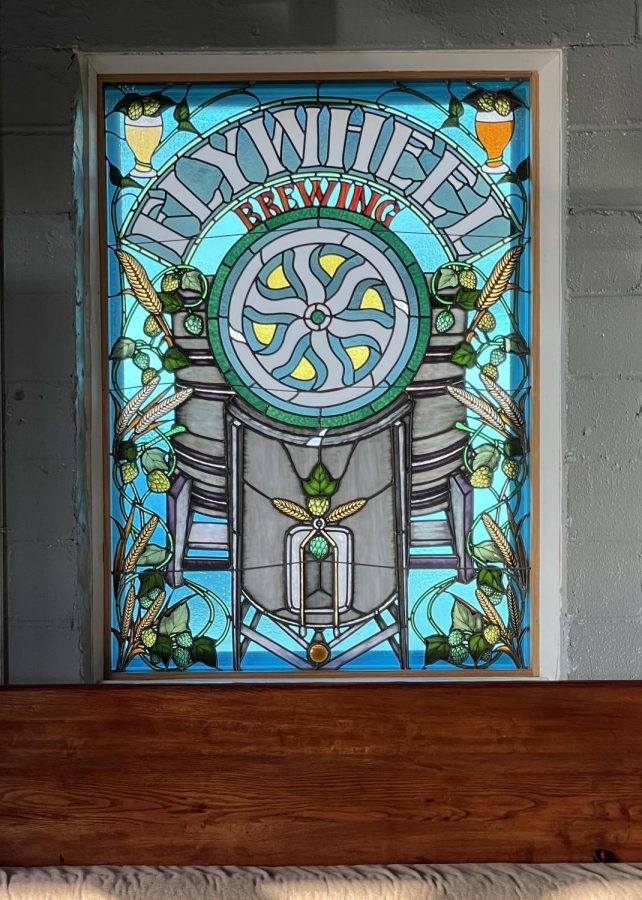
Behind the scenes in the brewhouse, the brew tanks are a hodgepodge of vats of differing origin. Two of them were snatched up from a scrapyard after being dropped off from the Smuckers plant in Scottsville. They cleaned off the remnants of jelly and got it into working order.
“Josh is the brains of the operation,” Willough said in that regard.
The building was in need of drastic renovation if it were to work for Flywheel. Josh took a leading role in the brewhouse, taking it upon himself to design the electrical wiring that controls the operation. The entire team pulled together to work on renovating the front end of the business.
As the pieces of their vision came together, word spread through town of their upcoming opening. They spent nothing on advertising — news spread purely by word of mouth. Curious volunteers soon popped their heads through the open front door to check on the progress as the staff went to work tearing down walls and installing facilities.
Zac Newton had heard about the planned brewery from a coworker at his previous job, Buffalo Wild Wings. Both Newton and his coworker had an interest in bartending, so Newton went down one day to inquire about job openings.
“I walked in here and just thought, ‘I need to work here,” Newton said. “I had some formal interview where I had to talk about beer for 15 minutes, and they were like okay, ‘clearly he’s a nerd about this stuff like we are, he’ll do fine.’”
Newton recalled that he often felt “like a cog in the machine” at other jobs, but not at Flywheel. He, along with the rest of the staff and owners, personally helped in the renovation process and can still see the marks of their labor around the bar today.
“Everything that is in here, somebody on staff had to say, ‘I got that,’” Newton said. “Everybody owns something in here that makes this place what it is.”
Flywheel’s opening night in 2017 was the moment that Hawkins knew they had made the right decision. They opened the day before Thanksgiving, hoping to catch people returning to town for the holiday.
Hawkins left his day job expecting to work the bar for a few hours before leaving for a family dinner that night. He arrived to find the bar filled to the brim.
“I walked in… you could not move because of the crowd,” Hawkins said. “My eyes were as big as my fist because I was so overwhelmed. I didn’t stop washing dishes and pouring beers till twelve o’clock that night.”
It’s hard to point to one reason for Flywheel’s success thus far. Willoughby attributes it to their attention to detail in the way they approach both their brews and the experience. He added though that many businesses can do everything right and still not make it.
Hawkins is personally proud of Flywheel’s ability to maintain consistent staffing, a difficulty in bartending circles. Bartending positions typically have high turnover, but only two new bartenders have been hired since Flywheel’s opening.
Their prevailing goal, Hawkins said, is to empower their staff to feel some ownership in the business. When one bartender took an interest in photography and social media marketing, for example, he went to the owners wanting to take over their accounts.
“He approached us and he wanted to do it,” Hawkins said. “He’s been good. I was doing social media [at the time] and I’ll be honest, we weren’t getting the feedback we are now.”
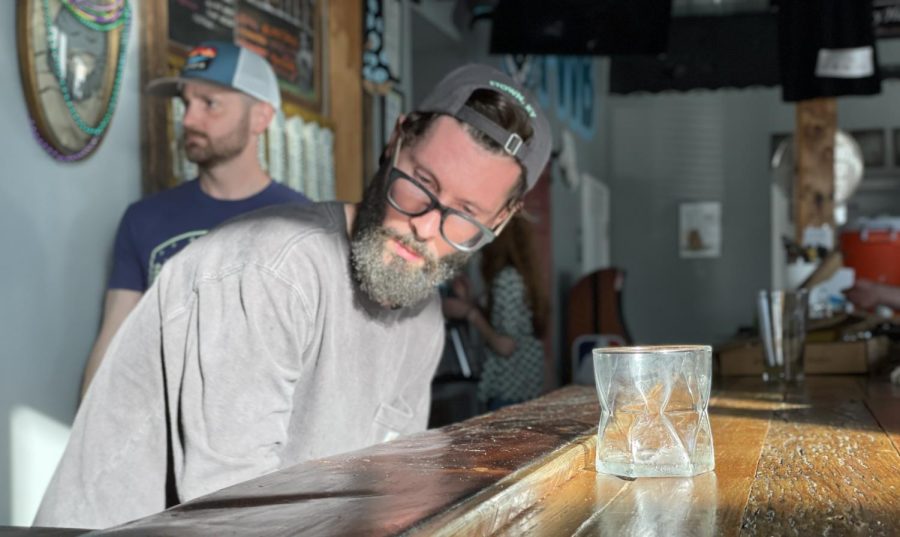
Hawkins also pointed to their ability to keep people engaged in their bar, largely by crafting an active community within itself. They host a popular trivia league four times a year, and the winner of each league is allowed to name a brew for themselves.
“Right now, our blackberry blood orange sour we have on is called ‘Strange Magic,’ because Strange was the last name of the team that won last year, so they named it that,” Hawkins said.
Trivia isn’t the only way customers contribute. Above the bar on a gray I-beam sits a row of dozens of rubber ducks: a Statue of Liberty, Wonderwoman, a duck in lederhosen.
The collection began when someone on staff found a rubber duck at closing time, likely left by a child whose family came earlier.
It was placed on the beam and forgotten about. One day, a couple came in with two more ducks — “for your collection” — and others began to take notice. Now, regulars and travelers leave ducks for display from all over the world. Each one gets a permanent birdseye view over the bar.
Willoughby says it’s kind of a “buy-in” to the brewery that they try to offer to both staff and customers — a sense of loyalty that goes both ways. He credits a lot of his early success to the regulars that felt comfortable coming back time and time again.
“The customers are really the people who help provide the good atmosphere,” Willoughby said. “You have a couple of good regulars, some people who are pretty friendly. A new customer comes in and sits down, and there’s not some asshole sitting beside them. That makes you feel like it might be a place you want to come back to.”
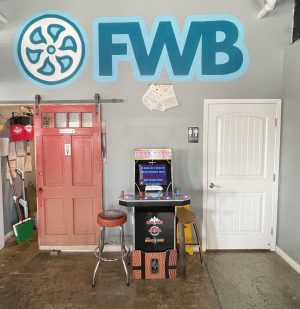
When COVID-19 prevented any new customers from coming in and sitting down, the business saw sales cut by half, but was able to stay open by selling growlers of beer to go.
“Especially early on during COVID, there was this whole push to buy local,” Hawkins said. “The community really helped us out and came to our rescue. There were people coming and buying growlers every week who would have never bought one before COVID.”
Flywheel “weathered the storm” and found itself in a steady place when Kentucky’s capacity restrictions were lifted in June 2021. They’ve seen better than average numbers since then as America’s in-person social scene reawakens to a new normal.
As Flywheel enters its fifth year of business, it can afford to explore bigger goals. Hawkins said the trend for microbreweries like theirs is to open up a new location, an option he said they’ve discussed. Regardless of if they do, they’re still looking to expand their production to some degree.
While the trio has talked, hatched ideas — likely over a beer, or a few extra — there’s still much deciding to be done.
Editor-in-Chief Michael J. Collins can be reached at [email protected]. Follow him on Twitter @MJCollinsNews.

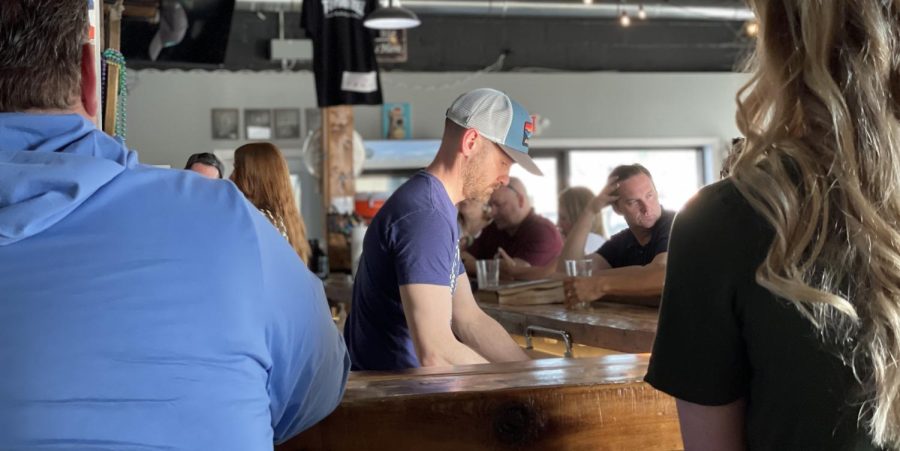

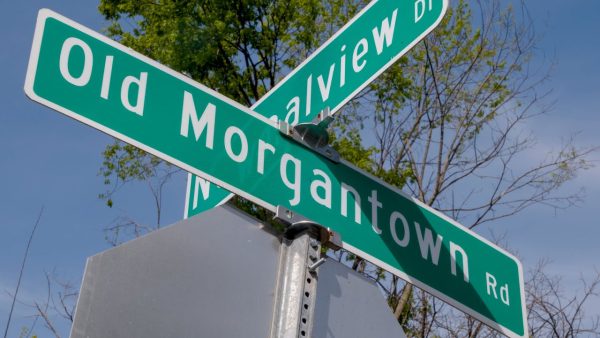
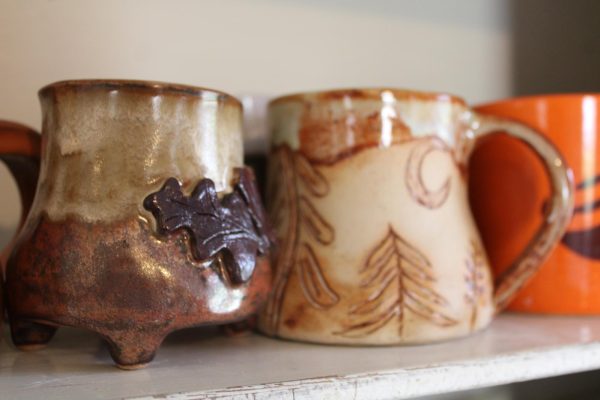




![Megan Inman of Tennessee cries after embracing Drag performer and transgender advocate Jasmine St. James at the 9th Annual WKU Housing and Residence Life Drag Show at Knicely Conference Center on April 4, 2024. “[The community] was so warm and welcoming when I came out, if it wasn’t for the queens I wouldn’t be here,” Inman said.](https://wkuherald.com/wp-content/uploads/2024/04/smith_von_drag_3-600x419.jpg)



